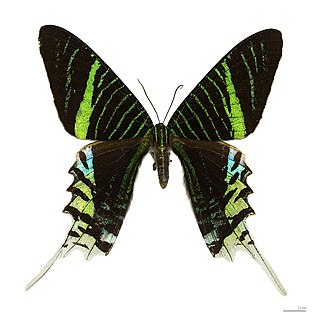
The Uraniidae are a family of moths containing four subfamilies, 90 genera, and roughly 700 species. The family is distributed throughout the tropics of the Americas, Africa and Indo-Australia. Some of the tropical species are known for their bright, butterfly-like colors and are called sunset moths. Such moths are apparently toxic and the bright colors are a warning to predators.

Angerona is a monotypic moth genus in the family Geometridae erected by Philogène Auguste Joseph Duponchel in 1829. Its only species, Angerona prunaria, the orange moth, was first described by Carl Linnaeus in his 1758 10th edition of Systema Naturae.
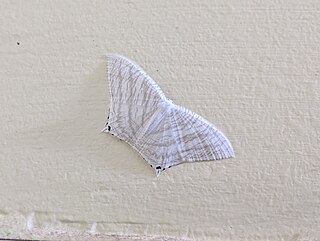
Micronia aculeata is a species of moth of subfamily Microniinae of family Uraniidae found in Myanmar, India and Sri Lanka towards Sulawesi. It was first described by Achille Guenée in 1857.

Lyssa zampa, the tropical swallowtail moth or Laos brown butterfly, is a moth of the family Uraniidae. The species was first described by British entomologist Arthur Gardiner Butler in 1869.

Urapteroides astheniata is a moth of the family Uraniidae first described by Achille Guenée in 1857. It is found in south-east Asia, from India, Sri Lanka to Fiji, including New Guinea and the tropical north of Australia.

Oroplema oyamana is a species of moth of the family Uraniidae. It is found in Korea, Japan, Taiwan, northern India, Nepal, Borneo and the Philippines (Luzon).

Phazaca leucocera is a species of moth of the family Uraniidae. It is found in Sri Lanka, southern India, China, Borneo and the Solomon Islands.

Pterotosoma castanea is a species of moth of the family Uraniidae. It is found in the north-eastern Himalaya, Taiwan and Borneo.

Europlema desistaria is a species of moth of the family Uraniidae first described by Francis Walker in 1861. It is found in India, Sri Lanka, Myanmar, Thailand, Taiwan, Borneo, Sulawesi, Flores and Queensland.

Phazaca theclata is a moth of the family Uraniidae. It was first described by Achille Guenée in 1858. It is known from Africa south of the Sahara, from Saudi Arabia, as well as from India, Japan, Myanmar, Nepal and Sri Lanka.
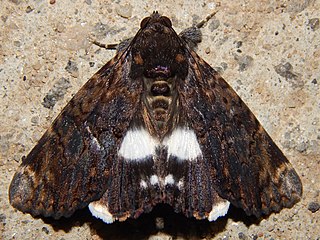
Nagia linteola is a species of moth in the family Erebidae first described by Achille Guenée in 1852. This species occurs in South Africa, the Democratic Republic of the Congo, Yemen, the Comoros, Mauritius, Madagascar, Indonesia (Borneo), India, Sri Lanka, Myanmar, Thailand and in Australia, where it has been recorded from Western Australia, the Northern Territory, Queensland and Victoria.

Dysaethria quadricaudata is a species of moth of the family Uraniidae first described by Francis Walker in 1896. It is found in the Indo-Australian tropics from India, Sri Lanka to Myanmar, Taiwan and the Solomon Islands. The habitat consists of lowland forests and disturbed and cultivated areas.
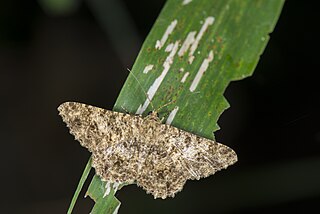
Racotis boarmiaria is a species of moth of the family Geometridae described by Achille Guenée in 1857. It is found in India, Sri Lanka, Maldives, Myanmar, China, Japan, Taiwan, Indonesia, Bhutan and Malaysia.

Pseudomicronia is a genus of moths in the family Uraniidae.

Urapteroides is a genus of moths in the family Uraniidae.

Artipe eryx, the green flash, is a species of butterfly belonging to the lycaenid family described by Carl Linnaeus in 1771. It is found in the Indomalayan realm.
Monobolodes parvinigrata is a moth of the family Uraniidae first described by Jeremy Daniel Holloway in 1998. It is found in Borneo and Sri Lanka.
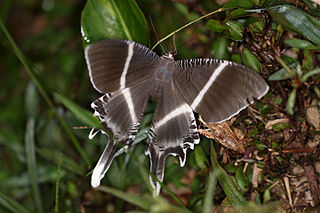
Lyssa menoetius is a moth of the family Uraniidae. The species was first described by German entomologist Hopffer in 1856.


















